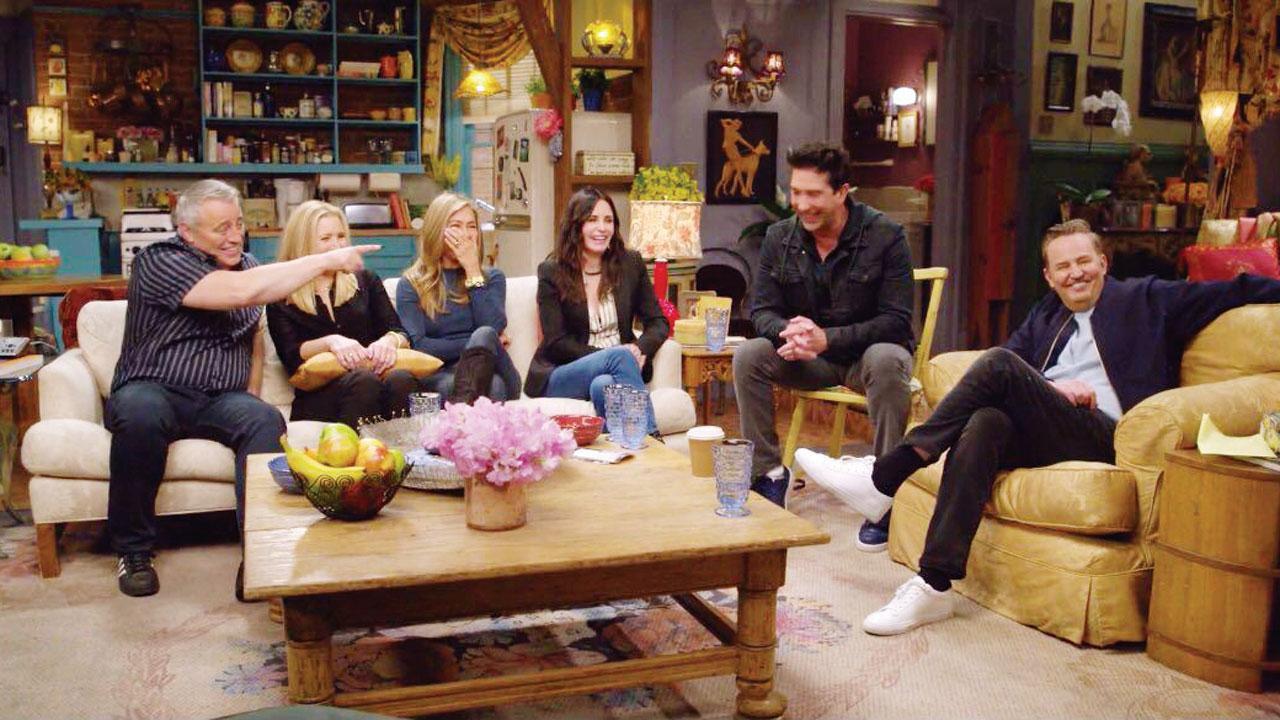Beauty of nostalgia is in it being uncomplicated. So doubters/Gen-Z, please sit down!

A screenshot from Friends: The Reunion. Pic/Twitter
To gauge appeal of a typically American sit-com Friends (1994-2004), across geographies through decades, the Reunion episode (2021) points to two young men, Samuel and Emanuel from Ghana, who say that the show really taught them how to be around girls—that they were otherwise too shy to be friends with!
ADVERTISEMENT
Being from Third World, you can equally connect with the two men, making a point about gender-neutral companionship—without as much self-awareness or attendant awkwardness—that ran through Friends.
The other glocal, New York City (NYC) sit-com from the same time, Sex and the City (1998-2004) seemed like its counter-point. Its posh, Cosmopolitan-laced ladies’ nights, being the exclusivist equivalent of the Friends’ relaxed, Central Perk.
Which, I suspect, normalised coffee-shops as the daily evening’s extension of the living room—among the young, better-off, across the world. Not so much a dating thing alone. Although while schooling in Delhi in the late ’90s, if someone alluded to a group as being so thick, but “so Friends-like”, they probably meant everybody’s been with everyone, in that coed cohort!
The show’s original, one-line brief by its creator David Crane appears to have resonated most from its sassy, Reunion documentary of sorts: “[It’s about] that time in your life, when friends are family!” Or, at any rate, friends are flat-mates.
I guess he’s referring to a phase, when you’re a working/earning adult, but single—in the city, but without spouse, or more importantly, child. What’s happened to this demographic since over a decade and half that the last Friends episode aired?
Can’t speak for all. But if NYC is indeed the singles’ capital of America, and Tier I Bombay somewhat its legit, desi equivalent, I observe far more men/women, progressively past their mid 30s—whether never married, living-in, separated, or divorced—almost permanently extending the ‘Friends phase’, into a proper life choice.
A way to be, rather than a rite of passage, as it were. The future’s not ours to see. I’m merely pointing to relevance. Does that explain the continuing attraction for Friends and its setting, while times have changed, and so have audiences?
That’d be taking psychobabble to another level! And disservice to a show that promptly proved how easy it looks (but difficult/serendipitous it must be) to keep it so simple, stupid.
That uniting the cast of a random, hangout sit-com, with six actors/reactors, with throwaway lines, walking in and out of an inexpensive set, would get Beckham (46), Bieber (27) and BTS (average age: 25), pitching in with desperate cameos, expressing their enduring love, in a reunion episode, 36 years since the first? Who would’ve thunk it!
Unlike its NYC predecessor Seinfeld (1989-98), self-explanatory for who’s at the centre, Friends isn’t about any particular character—Ross, Chandler, Joey, Rachel, Phoebe, or Monica. That makes it appear that it is about us—whether or not you pick your evolving favourite. As someone in the know once told me, every character also had an attached writer in the room to think/script specifically for them.
How the storytellers could pull this off for a decade, without any tension showing, for the lack of a lead, is a lesson for Indian filmmakers, who groan under the weight of egos, even in a quick-fix multi-starrer!
For, what’s an actor, if not naturally equipped to compete, especially performing before a live audience, which was the Friends set. Hell, even the Beatles broke up, and they had a tacit hierarchy in place.
What Friends had is the sort of alchemy that confirms your sense that actors, even the best of them, are mostly extensions of actual selves on screen, making casting such a lock-and-key thing. Looking at them decades later, in the same context, is therefore the most fitting mirror to how times have irreversibly flown by.
This is why Friends: The Reunion (2021) equalled mild melancholy, for watchers of network TV’s Friends (1994). But depends on who you were looking at, really—had my eyes on Rachel and Phoebe. Sorry, Joey—some age better than others.
As do shows. And comedies inevitably age best. You can still re-watch Charlie Chaplin. Try sword-and-sandal cinema from the same silent era. Also, like ‘comfort food’, there’s such a thing as ‘easy TV’— chewing gum for the brain, especially if there’s wine/beer, or too much food in the tummy.
From any episode to season, you simply click on it, with your legs up, head resting on the couch, before the screen blurs before your eyes, and you eventually pass out, having registered nothing. This is how, I suspect, Friends has been viewed over a 100 billion times across platforms!
I’ve never casually binged on Friends this way. Something similarly new always comes along—Schitt’s Creek, Curb Your Enthusiasm,
Two and Half Men; or Friends’ progenies, How I Met Your Mother, Big Bang Theory…
Which is why, I only recently read, but had no clue, how Friends got rediscovered as borderline/full-blown homophobic, sexist, ableist… #SoWhite, that it doesn’t pass the woke-purity test, with flying colours.
Here’s the thing. Can’t be bothered. That reunion was instantly moving. Like hanging with old friends/family. They’re memories. Beauty of nostalgia lies in it being uncomplicated.
So sit down, Gen-Z kid, go find your own friends.
Mayank Shekhar attempts to make sense of mass culture. He tweets @mayankw14
Send your feedback to mailbag@mid-day.com
The views expressed in this column are the individual’s and don’t represent those of the paper.
 Subscribe today by clicking the link and stay updated with the latest news!" Click here!
Subscribe today by clicking the link and stay updated with the latest news!" Click here!






